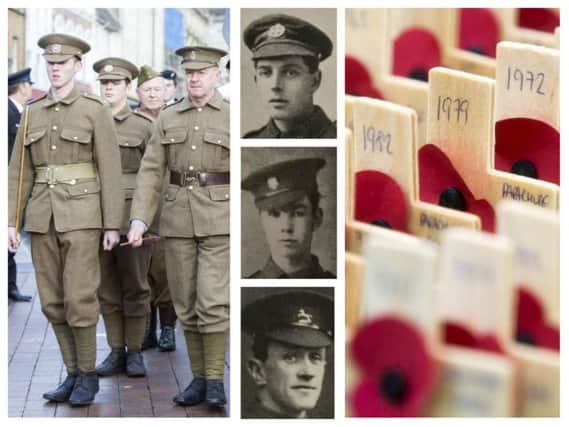Seven tips to help you research your Northampton family's First World War history


If the milestone sparked an interest in finding out more about your family's involvement in the Great War, Dr Caroline Nielsen, senior lecturer in history and heritage at the University of Northampton has shared some of her tips, designed to get your research started.
Free useful resources include public libraries and the Northamptonshire Archives in Wootton Hall, while online services like The British Newspaper Archive, ancestry.com and findmypast.com are also handy tools.
1. Explore and share family memories relating to the period


Advertisement
Hide AdAdvertisement
Hide AdDr Nielsen first recommends using family memories as a starting point to your research as important clues about someone's life are passed down through generations.
"Try and find out approximate ages, places of birth, marriage or death, or information on previous occupations," said Dr Nielsen.
"These small details may help you identify people quickly during your research."
Dr Nielsen says checking a family Bible may hold clues because ancestors could have noted down births, marriages and deaths in the book.
2. Be cautious about taking some stories at face value
Advertisement
Hide AdAdvertisement
Hide AdNarratives of events and stories do change over time. The more times a story is retold, the more likely it is that minor details may change, be misremembered or adapted to suit the audience.
"Be prepared that your research may ultimately prove a family story to be only partially accurate," said Dr Nielsen.
"Finding new information doesn’t detract from the family memory; it adds to our understanding of the day-to-day lives of those who experienced the First World War."
3. Check out the National Archives’ resources
The National Archives UK is the central archive for British government documents. Their website has dedicated pages on each branch of service personnel in British service.
Advertisement
Hide AdAdvertisement
Hide AdThis includes all branches of the Army, Navy, Royal Flying Corps and Royal Air Force, and merchant navy. It also holds some records relating to voluntary organisations and some prisoners of war. These can help guide your research.
4. Service numbers and regiment names
If researching a member of service personnel, Dr Nielsen advises finding their service number and regiment name.
The numbers will be listed on their records and knowing them can make cross-referencing any documents you find easier.
5. National and local newspapers
"Local and national newspapers are excellent sources of information," said Dr Nielsen.
Advertisement
Hide AdAdvertisement
Hide Ad"Reading newspapers from the time will tell you about people’s everyday lives and concerns, about what they were doing at work or for fun.
"If you are interested in researching servicemen or a regiment, newspapers also offer rare insights. Local newspapers routinely reported on major campaigns, often providing heart-breaking reports of the casualties."
Detailed biographies of fallen servicemen were often printed, sometimes with photographs. Many regional newspapers are now digitised and available online via subscription databases.
6. Census records
Census records will help you learn more about wider family members, neighbours and acquaintances. The census lists of all people in one house on a given day.
Advertisement
Hide AdAdvertisement
Hide AdThey are taken every 10 years, starting from 1841. The 1901 and 1911 census, in particular, will help you find birthplaces and birthdays. They are digitised and available through several different subscription databases.
7. Nicknames and different spellings
If you can’t find someone using a name search or their initials Dr Nielsen recommends trying nicknames or different spellings of names. While people were only supposed to use their full given name on official state records, sometimes people just gave preferred names or nicknames.
For example, Thomas may be Tom, Thom, Tommy, Tommie; Frederic might be Fred, Freddy, Freddie or Frederick.
"Sadly, some early twentieth-century immigrants in the UK and some religious minorities felt under pressure to change or anglicise their names," said Dr Nielsen.
Advertisement
Hide AdAdvertisement
Hide Ad"This was due to widespread prejudice and discrimination against minority groups in early twentieth-century Britain. This practice means that some people can be difficult to find in historical records."
Try comparing birth, marriage and death records with other occupational and census information.
The National Archives’ website can provide further sources of information.